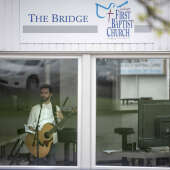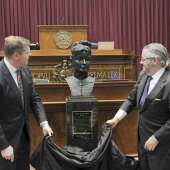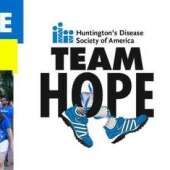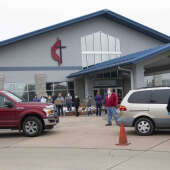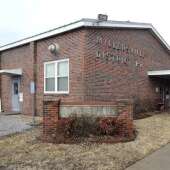Harry Rediger: One of the most impactful men in the history of Cape Girardeau

Harry Rediger retired as mayor of Cape Girardeau in April 2018 after serving two terms, eight years. Due to term limits, he could not run for re-election. Holding public office capped a long career of business success and community service.
For 20 years, Rediger was manager of the JCPenney store at the Cape Girardeau mall, where he also became heavily involved in the community through civic and charitable leadership, top positions in economic development and church and hospital boards. A native of Nebraska, he spent the early part of his career climbing the corporate ladder with JCPenney, living in towns both big and small, including Dallas and Kansas City. He was a recipient of the Southeast Missourian Spirit of America Award in 2009 and was arguably one of the most impactful mayors in Cape Girardeau’s history.
Rediger sat down with Jon K. Rust, publisher of the Southeast Missourian and contributor to B Magazine, to talk about what motivated him throughout his public service.
B MAGAZINE: All of your life, you have been volunteering to serve, whether that’s with city advisory committees, the hospital, your church, the United Way, the Chamber of Commerce, Greater Cape and more. Why has service been important to you?
HARRY REDIGER: Well, it really hasn’t been all my life, because early on in my JCPenney career, we moved every two to three years. And by the time we got settled into a community, I was asked to take a position elsewhere. That was kind of true here, when I first came to Cape Girardeau in 1977. But after getting to know people here, and wanting and asking to stay, it gave me the opportunity to see community needs and respond to needs, and my involvement grew from there.
I just believe in service, and I believe in paying it forward. I also found it very difficult to say no when asked. So there are some things I did and volunteered for, where I kind of wanted to say no because I was busy, but I just couldn’t. And it becomes a habit. It becomes a part of your life.
Then it just followed that I really enjoyed the service, and it became rewarding personally.
B: You talk about there being times when you wanted to say no to volunteering. You told the Southeast Missourian that after retiring from a successful career you had no intention to run for mayor of Cape Girardeau. But you were encouraged to do so, and it ultimately was one of the best decisions you ever made. What would you say to others who have never considered running for political office? Why should they do it?
REDIGER: Number one, they have to have a love for their community. They have to believe in their community and believe in the direction of the community. Number two, again, it’s paying it forward for what the community has done for the individual. And for their family. And then it just becomes very rewarding and enjoyable. Don’t be too quick to say no when you’re asked. I tried to say no, and that would have been a horrendous mistake on my part.
But I would say to others if you’re interested in the community, it doesn’t have to be an elected position. It could be an advisory board that you might have an interest in to kind of start to get involved, kind of test the water. Then see what happens. It could be Old Town Cape, a library board, your school parent committee, or some other part of the community, just to kind of test the water. Then see if it grows on you.
I spent 19 years on planning and zoning, and I thoroughly enjoyed it. I liked seeing exciting things come about and the different methods that people used to attack the problems. Helping people make projects work when there are some difficulties is very rewarding to me.
But I would go back and say that if you really love your community, like the direction it’s going, getting involved with making it better is a rewarding experience that you will never forget.
B: We just had an election, and as I looked around at sample ballots throughout the region there were a number of races where there was no candidate, or maybe there were four spots but only two candidates for the four spots. Are you concerned in any way about American democracy and civic society?
REDIGER: I am, especially concerning the younger generation. I feel that some of the younger generations do not have that will to get involved, to serve, not just in elected positions, but in other ways, too.
It’s difficult sometimes to get young people involved. They’re busy. They’re busier than we were when we were young with so many different activities. Their time is precious, and they have commitments to family, and rightfully so. But, yes, I do have that concern.
B: So you said that early in your career you, too, were working, building a family and career, moving around. What would you say to a younger version of yourself, to a young businessman or businesswoman?
REDIGER: Well in my situation, I didn’t get all that involved early, because I wasn’t in one place for a while. But I would tell young professionals to learn about their city, understand the issues and get involved. Leadership Cape is a perfect example of a place to start. They don’t really have to serve that much, as long as they are aware. It can be working with a non-profit or one of the city boards. It really doesn’t take a lot of time. But it does take some time. And, I think just as you tithe money to your church, you should tithe time, devote a portion of your time to service.
2692721 – police station
B: A major focus your last year as mayor was on the Purpose Built Community model for lifting up a section of Cape Girardeau that has not progressed like other areas of the city. Why has this priority been so important to you? What is it about this model that resonates?
REDIGER: First of all, in 2010, I got more involved in downtown than I’d ever been. And as I looked at downtown, I came to understand better what was happening on the Southside, too, and their needs there, and how a lot of those needs were ignored through the years, for a number of different reasons, and it was no one person’s fault. Then I was introduced to the Purpose Built model in Atlanta, and it really resonated with me. I thought, ‘This is something that we can do here.’
We don’t know yet whether we’ll become an official Purpose Built Community, but if we don’t, we’re going to do the model ourselves. The more I started getting involved there, the more I saw the need and the more I saw the skepticism of residents down there, who believed, “Yeah, right, you’re going to help us.” But, really, the model is about helping the area grow from the inside out.
Purpose Built has a motto that it uses: “What you do for me, but without me, you do to me.” And that’s been kind of the problem a little bit, in people expecting others to solve their problems. And we are right about to the point where we’ve got a group ready to take the lead, to identify a quarterback committee, and it’s going to be theirs. It’s got to be. It’s got to be individuals from that area taking the lead. There’s interest there, and I think it can blossom. The other thing is that this helps address the crime issue there, on a positive note, rather than a punitive one. It’ll be worth all the efforts that all those people in that area put into it. But it’s not a short process, it might be 10-15 years to develop all that’s needed.
The city can support, agencies can support, we’re here to support, but the neighborhoods themselves have to be involved and do it for themselves.
2896396 -trolly
B: You talked about the importance of loving your community as a motivation for service. What do you like best about this area that made you want to stay?
REDIGER: We had four kids, and we fell in love with the school district first. We had come from a very strong school district in Plano, Texas, and we were proud about our kids, so we had a concern before we arrived. But we were very much impressed with the quality of the education here, the teachers, the commitment of the teachers and the commitment of the district. So we really liked the school district.
The other thing that got us into this community is that we are a regional hub. We have a university, which is really important to us. Great health care. Centrally located. It just has all the amenities. And Fran and I kind of looked at each other and said, ‘if we can stay here, it would be good.’ It was pretty unusual for the Penney company back in those days to allow someone to do that.
This is really, really home. 42 years ago, it just evolved and evolved and felt more comfortable every year.
1809815 – casino
B: You’ve had many accomplishments as mayor. Bringing the casino here, which has helped tremendously with downtown development, improving parks, specifically with Cape Splash and the SportsPlex, improving roads and having various successful tax votes including the Transportation Trust Fund, redeveloping several large buildings in downtown, which could have been an inflection point for the city…
REDIGER: I remember standing on the intersection [of Broadway and Fountain streets] in downtown, January 2nd or 3rd, 2011, and all four of those corners, those big buildings were empty or were going to be empty within the year. If we couldn’t do those four corners, those big buildings, it was going to be difficult to continue the growth. It was so close at one point that the Marquette was going to be condemned and torn down. And look, this year they’ll all be full.
B: Your tenure also marked a strengthening of the relationship with the city of Jackson, the new convention center, the improved conversation with Southside residents and so much more. Is there something I haven’t listed that stands out to you?
REDIGER: The city’s infrastructure. I remember going to a meeting in December of 2010, on a very cold night, down at public works when they were unveiling the plan for the wastewater treatment plant, and then through a partnership with Republic, we got the transfer station. And we were able to build out the last of the fire stations, so now we’ve got all new fire stations and a new police station. Our infrastructure is in really good shape. Our airport yet has needs, and City Hall has needs. But I think we’ve made great progress in the last 10 to 15 years with city infrastructure that will carry us into the next generation. I think that’s a big win.
And it comes about because of our partnership with our citizens. It took votes to accomplish. I am very proud of our city and our staff and our council. But the citizens have really responded well to give us good, basic city infrastructure.
You know, the mayors up and down the river are very jealous of us. They envy our certified wall. We haven’t had those flooding issues because of the wall and the buyouts. We’re kind of the shining star up and down the river with what we have with flood control.
3060212
B: Do you have any concerns about the future of sales tax revenue and the dependency the city has on sales tax, particularly with the trends toward internet retail? And, where does property tax fit into the city’s plans for the future?
REDIGER: Internet retail is a threat, and property taxes are hard to come by.
The city of Cape is very dependent on sales tax. Sales tax is at risk because of the Internet, and it puts city services at risk because of our dependence on sales tax. The positive part of sales tax is that as a regional hub, people around the region that use our infrastructure and who use our facilities, they help pay the bill when they’re in town. So that’s a plus to sales tax. But we’re going to need to get a use tax passed, and that will be coming up next year.
People really need to understand how important this is.
B: We’ve talked about your career with JCPenney, a company that has seen a lot of ups and downs the past 10 years. Penney’s has made some major changes in their management and marketing strategy. How do you look at what they’re doing?
REDIGER: I’m just so disappointed in the company that they do not see service as an intricate part of the operation. They’re squeezing where they can, and the topline is suffering.
B: So if you’re going to differentiate yourself from the Internet retailer, it’s got to be on the service side?
REDIGER: Sure it does. And that’s the secret to success for small, hometown business people, who can provide that touchy-feely service, where customers may pay a little bit more. I think it’s a plus for small business compared to the Internet and even the brand stores, where the owner can get to understand their customers better and answer their needs, know them, serve them.
I look at Lowe’s and Menards, and then I go out and see Elias hardware succeeding because they say hello when you come in and ask what you need. And they’ll take care of you.
1490154 – council
B: As we close, anything you’d like to share that we haven’t covered?
REDIGER: My 20 years at Penney, we couldn’t have survived and our city couldn’t survive without our neighbors and friends in the region. If we weren’t a regional hub, we wouldn’t have near the city that we have, so it’s really the whole region that has allowed us to grow. We have a very stable economy, and that is because of our regionality and diversity. We don’t boom as high on the boom times, but we don’t suffer during the weak times as much. So we have really enjoyed and continue to enjoy people from five different states coming to Cape Girardeau to shop, work and play. They’re our partners, and we appreciate that.







